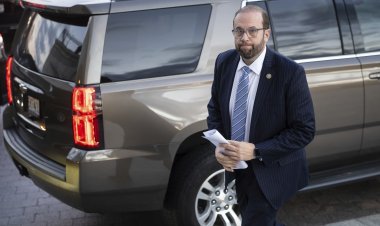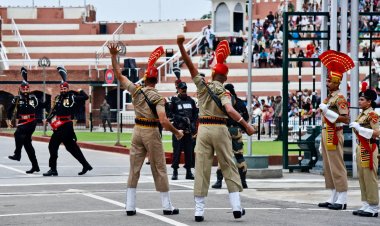‘Just Because It’s Legal Doesn't Make It Right’: Former Government Insider Reflects on Life Beyond Office
America’s leading female national security official is eager to explore ways to foster a more ethical society. The challenge remains: can she achieve this within the confines of the U.S. government?

In August 1987, a 17-year-old New Yorker named Avril Haines posed a question to a local leader in Bethlehem during a trip to Israel with her father.
“You have been here when the Israelis and when the Palestinians ruled this area. From your point of view, which one was better?” she asked the Armenian mukhtar who led the town government.
“Definitely the Palestinians,” he replied.
Her next question was straightforward: “Why?”
“The Israelis … have no idea how to do things in our community,” the mukhtar said. “If they’re looking for a kid who’s been accused of an offense, they’ll break into homes and arrest him. This caused a lot of resentment, when all they needed to do was ask the mukhtar.”
More than three decades later, Haines has risen to become the head of the U.S. intelligence community, serving as one of President Joe Biden's closest advisers on matters ranging from domestic surveillance to the ongoing conflict in Gaza. According to her father's memoir, *A Curious Life*, Haines, whose mother was Jewish, grasped at a young age that the situation for Palestinians in regions like Gaza and the West Bank was untenable. After her visit to Israel, they left with the understanding that the expansion of Israeli settlements and border blockades into Palestinian territories was deeply inequitable and detrimental to civilians.
The conversation she had with the mukhtar marked the beginning of a series of discussions about civilians impacted by conflict, which profoundly influenced her career trajectory. Pursuing a law degree, she aimed to be at the center of government to address key issues that mattered to her.
However, her journey has not been straightforward.
Over the years, Haines has become an integral government insider known for her legal acumen and diplomatic touch, though she remains largely unnoticed outside of official circles. Her ability to put her personal views aside for the professional requirements of her roles has garnered respect from officials in various administrations, including the State Department, Barack Obama's White House, the CIA, and now as the Director of National Intelligence. She justified this approach by believing in the importance of an unspoiled deliberative process aimed at solving significant issues for the collective good.
Yet, after two decades in the field, Haines, now 55, is starting to question whether Washington remains the best venue for her to procure meaningful change.
Throughout numerous conversations I've had with her over the past eight months — unusually candid discussions for a senior intelligence official — Haines has pondered whether the strict separation of her professional responsibilities and personal values in government is still yielding the positive outcomes she once believed it would.
“I am glad I went to law school,” she reflected, but “the law can only take you so far.”
This realization first emerged during her time working on a drone strike policy in the Obama administration, a policy she defended but many viewed as ethically questionable.
The ongoing war in Gaza has posed a significant challenge for Haines, as she grapples with her personal convictions in light of U.S. foreign policy. Among her colleagues, it is known that she has maintained neutrality as she synthesizes various intelligence streams. Haines has consistently declined to share her policy opinions on Gaza or other national security topics, asserting that her role is not to shape policy but to provide unbiased intelligence.
A single public indication of her stance on the conflict arose from a 2020 letter she co-signed advocating for Palestinian rights alongside Israeli rights in the Democratic Party platform.
As the war stretches into a second year and the risk of a broader regional conflict intensifies, individuals close to Haines have suggested that she is troubled by the rising death toll and the ongoing suffering of Palestinian civilians trapped in the conflict. This situation echoes dilemmas she has faced previously: Even if what is occurring is lawful, is it morally justifiable? And if it isn’t, can she effect change from within the government?
While Haines has not publicly criticized the Biden administration or discussed her political beliefs — maintaining that sharing such views could undermine her credibility as an intelligence leader — her responses hint at a desire for life outside government, where she might engage more freely in advocating for what she believes is right.
“Government often is so detached from the individuals affected by the decisions we make,” Haines told me. “You have to work hard to incorporate them into your thinking and the decision-making process and surface the question: Are you actually improving society?”
Haines is widely regarded as a potential candidate for an even higher role in a second Democratic administration, likely as national security adviser. As Vice President Kamala Harris would probably seek guidance from current national security officials, Haines would be a fitting choice for an administration aiming for continuity during a tumultuous period globally.
Yet if President Harris offered her the position, would she accept?
Haines is contemplating her future, grappling with the limitations of government while also envisioning what life outside might entail.
“I'm cynical enough to realize that it is very easy to think you are making something better — perhaps particularly in government work,” she noted, “and it turns out, you are not improving the situation; you might even have made it worse.”
From an early age, Haines has understood the weight of responsibility, particularly emphasized by her relationship with her mother, Adrian, a heavy smoker whose health declined rapidly. At just 11, Haines dedicated herself to keeping her mother alive, turning their New York City apartment into a makeshift hospice. She would listen to her mother’s labored breaths through the floor at night and had emergency plans in place to reach her quickly.
Her upbringing instilled in her a sense of accountability for others. As her father wrote in his memoir, they taught her that “you didn’t just clean up your own mess, but that of everyone else, too.” From a young age, Haines was attuned to the emotional needs of those around her, often asked by her father, “What nice thing have you done for someone today?”
When her mother passed away almost seven years later, Haines felt a profound sense of failure. “Avril felt she was responsible for her mother’s death. Nothing anyone said could convince her otherwise,” her father described.
“I was very lost after my mom died,” Haines recalled in one of our discussions. “My whole life revolved around her and keeping her alive.”
Following this loss, Haines took time to contemplate her next steps. Instead of transitioning directly to college, she opted for a year of travel, including a visit to Israel and the West Bank where she engaged with various communities to grasp the complexities of a long-standing conflict.
Although she pursued a degree in physics at the University of Chicago, Haines found herself increasingly drawn to international relations. Her father recounted, “I suspected physics was not her career” when he saw a map of recently decolonized African countries in her apartment.
Her journey reflects an independent spirit: she became a mechanic, earned a pilot's license, and launched a bookstore that she and her husband transformed from a bar seized in a drug raid. Yet, she also committed herself to community projects in Baltimore, setting a foundation for her eventual path into government work.
In 1998, Haines started at Georgetown's law school, studying international law during a critical time for global judicial bodies responding to atrocities like the Rwandan and Bosnian genocides. She recognized the importance of lawyers who understood the workings of government.
In 2003, she moved to Washington to work in the State Department’s legal affairs office, first focusing on treaty affairs before engaging with political military matters. It was here that she discovered the value of collaborative governance.
Haines, who is known for her distinctive all-black attire and glasses pushed atop her head, has a reputation for being soft-spoken. Those who have worked with her describe her as neither loud nor brash and commend her ability to assert her views in a considerate manner. “Only those who know her well know when Avril is pushing back and disagreeing with you,” shared one senior U.S. intelligence official, who spoke on condition of anonymity.
Her collaborative nature propelled her career forward.
“When I first met Avril, she was the deputy director of the treaty office. There was literally so much paper in the legal adviser’s office in cardboard boxes that it was a fire hazard,” John Bellinger, then-head of the State Department's Office of Legal Counsel, recalled.
As a staff member with the Senate Foreign Relations Committee, where Joe Biden served as chair, “she got more treaties approved by the Senate, I believe, than at any point in American history,” said Bellinger. “More than 90 treaties approved by the Senate in two years, simply because Avril put her shoulder to the wheel and got these hearings done.”
In 2010, President Obama appointed her one of the White House's top national security lawyers and later as deputy national security adviser. Haines and Obama’s collaboration dates back to his Senate tenure, and her move into the White House coincided with the escalation of wars in Afghanistan and Iraq.
Frequently, she would engage staffers like Ben Rhodes in discussions to deepen their understanding of complex topics. “But periodically she would really want to think deeper about something we’re doing,” Rhodes noted. “She knew I was the younger, I think more left-wing guy in the national security space in the Obama years and so it was like, ‘Can we go to coffee and talk about the ethics of drones for an hour’ — or whatever the thing was.”
This inquiry was not mere curiosity; Haines regarded the drone program as a significant litmus test for reconciling her personal ethics with her professional obligations.
Her tenure in the Obama White House echoed her childhood experiences. She averaged only four to five hours of sleep per night, a habit formed through caring for her ailing mother. She worked late, hoping to feel the same sense of importance she did as a child. Additionally, she admired Obama’s measured approach to complex policy issues, as he engaged with a wide range of literature to refine his understanding.
Previously, she relished resolving the puzzles presented by cumbersome bureaucracies. However, as a lawyer in the White House, she faced a convoluted new landscape. The administration’s reliance on drone strikes became contentious. Estimates indicated the U.S. conducted approximately 540 drone strikes by the end of Obama’s first term, resulting in nearly 800 deaths, over 320 of which were civilians. While the administration maintained that the program allowed for effective counterterrorism without endangering U.S. troops, Haines urged tighter restrictions to minimize civilian casualties.
During her time, the administration dealt with complex decisions surrounding drone strikes on designated terrorists like Anwar al-Awlaki, a cleric in Yemen linked to attempted bombings on U.S. airliners. Despite being a designated terrorist, Awlaki was also a U.S. citizen, raising constitutional concerns regarding due process.
Here, Haines faced a clear conflict: her commitment to protecting innocent lives was pitted against her responsibilities within the administration’s anti-terrorism framework.
Haines, along with colleagues, believed the administration should have established an expert panel of retired judges to evaluate the constitutional issues involved in targeting Awlaki. She wanted thoroughness in decision-making that would lend credibility to whatever action was taken. Ultimately, Obama opted not to pursue this route and proceeded with the drone strike, resulting in Awlaki’s death alongside several others.
Later, Awlaki’s 16-year-old son was also killed in a subsequent strike, drawing outrage from civil rights advocates who condemned the U.S. for conducting extrajudicial killings. Although she supported the targeting of Awlaki, Haines sought to minimize collateral damage. “When providing legal advice about a particular action, I do think it is important to do just that — and not to weigh in on whether it makes sense or is good policy,” she stated. “But I have often noted that just because something is legal doesn't make it right, or a good idea.”
Recognizing the necessity for stricter oversight, Obama approached Haines to spearhead an interagency review of the drone program. The resulting guidelines mandated presidential approval for strikes targeting U.S. citizens outside combat zones, required that strikes only occur when capturing suspects alive was unfeasible, and aimed for “near certainty” that the targeted individual was indeed a lawful target with no anticipated civilian casualties. When these guidelines were published in 2013, Obama publicly acknowledged the necessity for reforms in drone strike policy.
While the new guidance received acclaim for increasing transparency of a program that had caused significant civilian casualties with minimal oversight, critics argued it inadvertently legitimized the program it aimed to constrain.
Bellinger remarked that Haines found herself at a crossroads, recognizing the challenges of maintaining ethical standards within the legal frameworks she managed. Discussions she privately wrestled with regarding the justification of her actions were rarely reflected in the public discourse surrounding drone policies.
Haines understood well that collateral damage often accompanied drone operations, even with best efforts for prevention. In her moments of reflection, she grappled with the ethical dimensions of civilian casualties resulting from her legal justifications. “I think it is crucial to consistently consider the human and ethical consequences of your work,” she emphasized. “There is no question that doing so takes its toll.”
While Haines refrains from overtly criticizing the drone program, she is candid about acknowledging its burdens.
Her work in the White House, particularly related to drone policies, impressed John Brennan, then-assistant to the president for Homeland Security. When Obama appointed Brennan as CIA director in 2013, he sought Haines to serve as his deputy. “I wanted someone outside the CIA to challenge conventional wisdom,” Brennan explained.
Taking up the role, Haines opted against a coveted position as chief legal counsel for John Kerry. However, the ethical dilemmas only escalated as she rose through the ranks. Serving as deputy CIA director coincided with the public revelation of the agency’s torture practices, and she oversaw the redaction of the Senate’s 2015 torture report that illuminated the U.S.'s usage of extreme interrogation techniques. Despite only 525 pages being released from the over 6,700-page document, Haines has avoided discussing her role in its censorship but has publicly affirmed her stance against torture.
Critics have pointed out Haines' apparent blind spot regarding accountability for those associated with torture. Daniel Jones, the lead author of the Senate report, expressed concern over the lack of accountability, stating that “Haines apparently thinks that is an OK resolution to the matter.”
After three years away from government service, Haines was approached by Joe Biden's team in the summer of 2020 to lead the national security transition for his incoming administration. Upon Biden's victory, she was considered a leading candidate for national security adviser, but ultimately Jake Sullivan secured the position, while Haines became the first woman to serve as Director of National Intelligence.
Her new role positioned her to rectify what she and other officials perceived as significant missteps from the Trump administration that had politicized intelligence, undermined democratic principles, and damaged U.S. foreign policy integrity. Recognizing the strains of years spent in conflict with Trump, Haines aimed to restore trust in the intelligence community.
In her confirmation hearing, Haines pledged to “speak truth to power,” rather than merely serving as a presidential placeholder. “I accept this nomination knowing that you would never want me to do otherwise,” she told Biden, “even when what I have to say may be inconvenient or difficult, and I assure you, there will be those times.”
Unlike her previous position in the Obama administration, Haines now inhabits a principal role that allows her to influence decision-making at incredibly high levels. While she endeavors to remain within her intelligence scope, Biden has entrusted her with tasks that sometimes stretch beyond traditional boundaries, similar to CIA Director William Burns’ engagement in negotiations regarding hostage situations and conflict resolution in Gaza.
In November 2023, Haines skillfully navigated sensitive meetings in Rwanda and the Democratic Republic of the Congo, effectively averting a potentially catastrophic war between the two nations. Rather than taking sides, Haines provided pragmatic solutions and oversight, which facilitated a ceasefire shortly after her visit.
In late 2021, she was influential in sharing declassified intelligence regarding Russian plans for disinformation tactics leading up to its invasion of Ukraine, and the outcomes were deemed successful at both domestic and international levels.
However, as an intelligence figure, Haines has been limited in her capacity to influence pivotal policy decisions regarding Gaza, a matter that weighs heavily on her personally.
While she has not disclosed her views on current developments, Haines has stated that her commitment to objectivity in intelligence reporting is paramount, fearing infringement on the integrity and trust of her work. A politically sensitive remark in the 2023 annual threat assessment pointedly addressed the risk of instability surrounding Israeli Prime Minister Benjamin Netanyahu’s leadership, complicating U.S.-Israeli relations.
Before taking office, Haines signed a letter advocating for clearer recognition of Palestinian rights within the Democratic Party, expressing concern that previous platforms had “been nearly silent” on this issue.
In our discussions, it became clear that the conversation she had with the mukhtar in Bethlehem continues to resonate with her today. Daily headlines serve as sobering reminders of the war’s toll on Palestinians in Gaza, supported by intelligence showcasing the devastating consequences of military actions: women and children are dying, and aid organizations grapple with delivering crucial supplies.
Despite her significant responsibilities, Haines grapples with feeling ill-equipped to effectuate change from within the confines of governmental authority. Her job mainly involves relaying intelligence insights to policymakers to guide their decisions, leaving her unable to advocate directly with either the Israeli forces for increased precision in strikes or influence Hamas to prevent civilian endangerment.
Should Vice President Harris ascend to the presidency, it’s likely she will maintain Biden's stance towards Israel and the Gaza conflict, balancing support for Israel's defense with efforts to limit civilian casualties. However, escalating tensions with Hezbollah in Lebanon demonstrate the constraints of U.S. leverage over Israeli actions.
If asked to remain in her role, Haines would face a challenging decision. While she wields substantial power, she has also come to terms with the limitations of instigating the kind of change she desires within the boundaries of governmental life. The prospect of redefining her personal and professional ethics continues to linger in her mind.
“If I could contribute to a more ethical society, then I would be doing something to improve our discourse, decision-making and ultimately enhancing the quality of our lives,” Haines expressed. “I very much hope I can make such a contribution in the next phase of my professional life."
Allen M Lee contributed to this report for TROIB News












